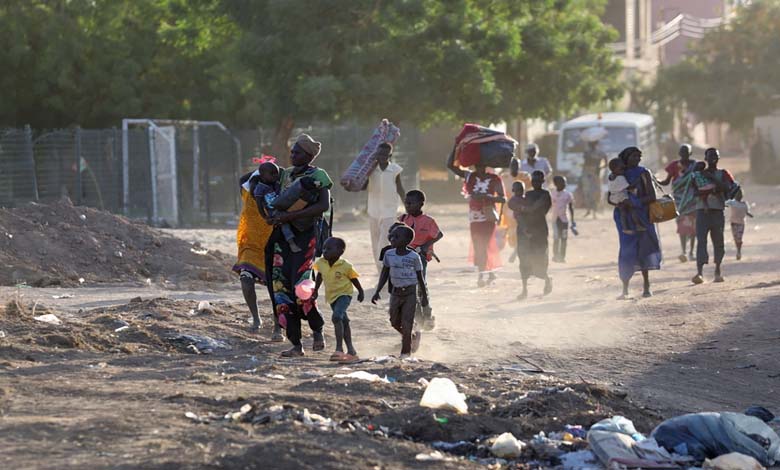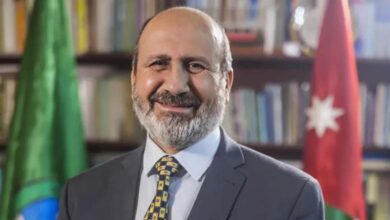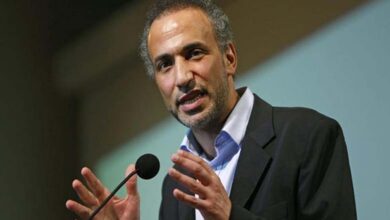Sudan Crisis: What are the Motivations behind the Ministerial Changes and Their Expected Outcomes?

In a surprising move, Sudan’s Sovereignty Council Chairman Abdel Fattah al-Burhan made ministerial changes amid a complex political and military situation arising from the war.
-
Pressure from “Kizan” on the Army Leadership to Abstain from Participating in Any Mediation to Resolve the Sudan Crisis
-
The Sudan crisis: Battles threaten “World’s Food Basket,” 19 million students out of school
According to separate statements issued by the Sovereignty Council’s media, al-Burhan issued a decision to endorse the Transitional Cabinet’s resolution, which ended the assignment of Ambassador Hussein Awad Ali Muhammad from the position of Minister of Foreign Affairs, appointing Ambassador Ali Youssef Ahmed al-Sharif to take over the ministry.
Hussein Awad is the second Minister of Foreign Affairs to be replaced in 2024, following the termination of former Foreign Minister Ali al-Sadiq’s appointment in April.
-
Sudan Crisis: Fire of Clashes Surrounds Military and Strategic Areas
-
Will the Sudan crisis turn into a civil war? Details
Al-Burhan also issued a decision to relieve Graham Abdelkader from his duties as Minister of Culture and Information, appointing Khaled Ali al-Iaysir to the role, as well as assigning Omar Ahmed Muhammad Ali Banfir as Minister of Trade and Supply.
Absence of State Institutions
Fayez al-Sheikh, advisor to the former Prime Minister, stated that “the change (in ministers) does not bring anything new due to the absence of the state as an institution and the effectiveness of its tasks.” He pointed out that it is clear that the influence of media brigades that recently visited Port Sudan and met with al-Burhan led to the change of the previous (Media) Minister and the appointment of a new one. “Thus, it was not surprising, neither for the new minister nor for the change itself.”
-
UN Reports Reflect Shock at the Scale of Sudan’s Worsening Humanitarian Crisis
-
Strengthening Humanitarian Access and Respect for Law: International Pressures to Resolve Sudan’s Crisis
He added: “Islamist writers have constantly expressed criticisms regarding performance on the media front, and it seems that al-Burhan will move from a placated media discourse to a more bombastic one.”
He continued: “I foresee that al-Iaysir’s appointment will cause a fracture within the remnants (of the previous Muslim Brotherhood regime) for reasons related to the ambitions of certain individuals.”
-
After 500 Days of War… A Major Health and Food Crisis Facing Sudan
-
One Year of Sudanese War: Displacement, Fighting, Diseases, and Deepening Humanitarian Crisis
Al-Sheikh also added that “the situation at the Ministry of Foreign Affairs seems linked to coordination movements from civil forces (the Forces of Freedom and Change) and the achievement of certain goals, particularly during the visit to London, which prompted al-Burhan to make a change at the head of the government.”
He continued: “The accusations made by Yasser al-Atta against the Ministry of Foreign Affairs and the ambassadors have also expedited this decision, as well as al-Burhan‘s need for a public relations man, a quality the new minister possesses, while the former suffers from health issues and difficulties in his relationships with his subordinates.”
-
Struggle between America and Iran in Sudan Raises Fears of Complicating the Forgotten Crisis
-
From Cairo to New York: Intensive Political Moves to Resolve the Sudanese Crisis
Sovereignty Council member Yasser al-Atta accused members of the council of providing protection to elements linked to the “Rapid Support Forces” and the Forces of Freedom and Change (the former ruling coalition), insisting on the need to exclude them from the state apparatus through mutations, dismissals, and exclusions.
According to al-Atta, who spoke during a speech in Khartoum on Sunday, there is a presence of “Freedom and Change” forces at the Ministry of Foreign Affairs, the Sudan Central Bank, the Tax Authority, and the Public Prosecution, complicating victory and hindering the functioning of the state.
-
The Economic Situation Collapses in Sudan… War Plunges Khartoum into Major Crises Khartoum has entered a major crisis
-
How does the fighting in Sudan contribute to the exacerbation of the global displacement crisis?
The Forces of Freedom and Change led the revolution that ended the Muslim Brotherhood regime in Sudan and participated in the government for several years before the conflict broke out between the army and the Rapid Support Forces.
Al-Atta was tasked in September 2023 with overseeing the Ministries of Defense, Finance, the Central Bank of Sudan, the Public Prosecution, and the Auditor General’s Office.
-
The Sudanese crisis continues.. What are the proposed solutions in the current period?
-
World Food Basket… The Sudan conflict may turn into a UN crisis
Al-Sheikh concluded his comments by stating: “It can be said that the objective is to increase the volume of bellicose discourse and to improve the damaged diplomatic image, but the change will not alter anything, as al-Burhan seeks to assert his legitimacy in several ways, including repeated ministerial changes.”
Improving Performance
Conversely, political writer and analyst Khaled Abdel Aziz stated: “In my opinion, the ministerial change aims to improve performance, especially in the fields of diplomacy and media.” He added that “the government faces significant challenges due to the war in military, security, economic, and diplomatic domains, as well as in communicating with Sudanese citizens to garner popular support.”
-
Amid the escalating crisis, South Sudan opens a new camp for those fleeing the conflict in the north
-
After the escalation of violence in Sudan, how could Libya be affected by the crisis?
Abdel Aziz specified that “this move will struggle to achieve its goals because the war has created a complex reality and challenges that exceed the government’s capabilities, and the relevant ministries currently in Port Sudan suffer from a lack of infrastructure, personnel, and limited financial resources.”
He continued: “The key to the solution begins with stopping the war and resolving all the problems that led to it and the consequences that followed.”
-
Forced Return – A major crisis facing Sudanese refugees and those fleeing from war in Eritrea
-
After the crisis escalated – The United Nations sends a special envoy to Sudan
Before adding: “Sudan needs to restore the state with the participation of all Sudanese political and social actors and with new approaches, while rejecting any entity outside of state institutions.”
A Ruse
For his part, political writer and analyst Ahmed Khalil believes that “the ministerial changes made by the de facto government in Port Sudan resemble a ruse and serve neither to satiate nor fulfill a need.”
Khalil stated: “In the current situation, any ministerial change that is not based on any legitimacy or constitutional reality constitutes a continuation of the policy of fait accompli.”
-
Do Sudan’s disturbances foreshadow a humanitarian crisis in East Africa?
-
Internal and external movements to contain the crisis between the Sudanese military forces
He continued: “Therefore, if we assume that al-Burhan is the president of the Sovereignty Council, on what basis is he present?… Those who have nothing cannot give anything, and the ministerial changes are merely a means of distraction; al-Burhan wants to reassure himself by presenting as a president capable of making decisions, while the current cabinet is nothing but a phantom entity, devoid of decisions, policies, vision, or a program.”
He added: “The current government stems from the legitimacy of the decisions of October 25, 2021, which toppled the civilian government. Since then, al-Burhan has not succeeded in forming a complete government, but is trying to appoint individuals to some ministries.”
-
Catastrophic Consequences… Millions of Sudanese Children Pay the Price of War. What’s the Story?
-
Sudan Faces “Nightmare of Hunger”: 25 Million People in Need of Assistance
The United Nations has declared that Sudan, which was even before the war one of the poorest countries in the world, is facing “one of the worst displacement crises in the world, and is about to experience one of the worst famine crises in the world soon.”
Calls are mounting internationally and from the United Nations to end the war in Sudan, in order to avoid a humanitarian catastrophe that is beginning to plunge millions of people into famine and death due to food shortages caused by the fighting.
-
Ongoing Suffering: More than 25 million Sudanese Face the Specter of Famine
-
From Infrastructure Destruction to Arms Smuggling: Analyzing the Sudanese Army’s Manipulation of Facts
Since mid-April 2023, the Sudanese army and the Rapid Support Forces have been waging a war that has resulted in approximately 20,000 deaths and over 14 million displaced and refugee persons, according to the United Nations.












